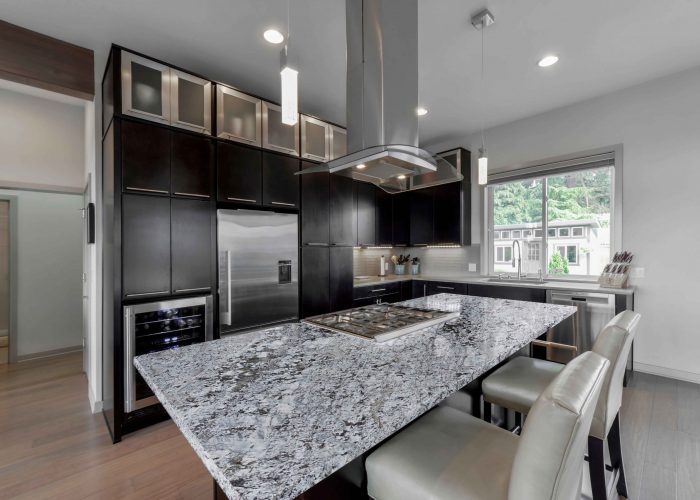Granite Countertop Size & Thickness Options
Granite Worktops
Granite Countertop Size & Thickness Options
When choosing a stone countertop for your kitchen, granite is a great option. When choosing granite worktops, not only will you have to think about your kitchen design, layout and the colour you want your worktop to be, you will also need to consider the size and thickness of your granite worktop.
We have compiled a quick guide to help you understand the sizes and thicknesses available when choosing granite countertops for your home.
In this guide:
- Choosing the right granite worktop size
- How thick should granite countertops be?

Choosing the right granite worktop size
Granite worktops are cut into slabs by the quarries and fabricators that process them before they’re sent off to suppliers.
This means that granite worktops are usually provided in a variety of different slab sizes and will be cut to size by your supplier, depending on the layout and size of your kitchen.
The width of granite worktops tend to start at around 600mm and go up from there. Whichever worktop you choose, it can be trimmed or cut to meet your needs. Maximum worktop lengths tend to be 3 metres so, if you’re looking for a longer expanse of worktop, there will be a join. Most fitters should be able to minimise the look of the join so it’s hardly noticeable once your worktops have been installed.
The size of the granite worktop you choose will be subject to the type you choose, as well as the supplier you choose.
At Stone Synergy, our granite worktops are available in individual slabs and you’ll be able to inspect and choose your slab. It will then be reserved and cut to meet your needs. It’s important to remember that granite is a natural stone so is not consistent in colour and design – this is why it’s so important to go and see your slab before confirming it.
Our granite kitchen worktops are priced based on square foot measurements of the slab you choose and prices will vary depending on the product.
How thick should granite countertops be?
In addition to the length and width of your granite worktops, it’s also important to consider the thickness of your worktop too.
Wooden and laminate worktops are available in thicknesses of between 38mm to 40mm. However, the standard thickness for most stone worktops, including quartz slabs and granite, is 30mm. Thinner options of 20mm are also now available as the demand for thinner stone worktops has increased.
Should you choose a 20mm or 30mm granite worktop?
There are usually two thickness options when it comes to granite worktops. They’re available in 20mm and 30mm thicknesses. Any thicker than this and the worktop can be extremely heavy so your kitchen cupboard carcasses may need reinforcing. Any thinner and the worktop can be prone to cracking.
20mm Granite Worktops
Most granite slabs are not available in 20mm so there are a wide range of options when it comes to choosing this thickness. The suitability of this thickness is usually assessed on a slab by slab basis. Not all types of granite are suitable for this and will be thicker to protect the integrity of the slab.
Some 20mm thick worktops are more suited to other applications such as the bathroom as their light weight means they require less support.
One of the biggest advantages of this countertop hickness is its weight. This size will be much lighter than thicker worktops, meaning that they will put less strain on kitchen carcasses. On the other hand, there is a risk of cracking and breaking at the weak points of the worktop if they are not properly supported or reinforced.
The cost difference between 30mm worktops and 20mm worktops is usually between 8-10% but this will be confirmed when you ask for a quote from your chosen supplier. If you’re replacing your kitchen on a budget, the smaller thickness can make the overall cost lower. Installation costs may also be slightly lower due to the lower weight of the slab being installed – the size of the slab will also have an impact.
30mm Granite Worktops
This is the most common size for granite worktops. Most quarries cut their slabs for the retail market in 30mm thickness so there is plenty of choice available when you opt for this thickness.
It is often recommended that you opt for 30mm granite worktops because they are stronger and more durable than 20mm worktops which means you’ll have a worktop you can enjoy for decades.
30mm granite worktops are more expensive than thinner options but, due to the popularity of engineered quartz surfaces, means that granite prices have been dropping in general.
If you’re looking for a thinner and more streamlined look for your kitchen, a thinner worktop will provide the best results. However, not all granite worktops are available in this size so, if you can’t find the colour you want, you may want to have a look at quartz worktops instead. These worktops can be made in 20mm thicknesses with fewer problems than granite and still provide the same look and feel. They also provide a much more consistent and solid colour for your kitchen worktop.
For kitchens where the thickness of the worktop is not an issue, 30mm granite worktops are the best option and provide a solution for worktops, breakfast bars and islands.
